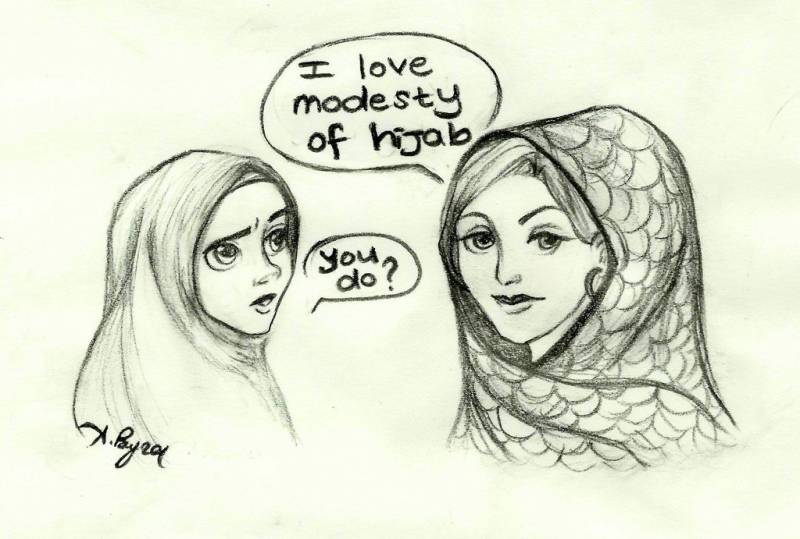Image Courtesy: icebec.deviantart.com
Last week I had an article published here about a video on the Guardian that went viral, in which a British woman named Hanna Yusuf describes her hijab as a “feminist statement”.
Since then Hanna decided to follow up with an article, which does not really address some of the points that I, or others, raised. I won’t repeat everything I wrote earlier – for that you can read my piece here and here.
Hanna begins the piece by writing:
“It seems that the only time a hijabi’s voice is valued is when she gives a testimony describing her struggle for emancipation from Islam. Otherwise, she is either lying or in denial. I found this out the hard way in the past 10 days.”
First of all, Hanna herself chose to make a video to talk about the hijab. She wasted an opportunity to make a video about any subject to show that women in hijabs do - shock horror - have opinions about other things.
And I’m sorry but I have very little patience with this, oh woe is me attitude, when there are two women in Morocco who are being prosecuted for indecency for wearing summer dresses in a souq. As far as I am aware, no one is arresting Hanna for wearing her hijab nor is she being forced to remove it.
By implying that women who don't wear the hijab are slaves to glossy magazines and consumer pressures, Hanna makes the same patronising generalisations that she claims people make about hijabi women.
You cannot criticise or shame a woman for her decision to wear a mini-skirt, bikini or any dress deemed as “sexually alluring”, but play the victim card when questioned on your decision to wear a hijab. The respect and acceptance of the other’s choice goes both ways.
She says she is standing against sexual exploitation, but why must women make up for the shortcomings of others? Is she implying that women are responsible for their exploitation and abuse?
“The control hijabi women have over their bodies,” Hanna continues, “Challenges existing structures”.
Where do I begin with this? Firstly, this idea that hijabi women have control over their bodies is not only simplistic but also ludicrous. Women are told to cover so that they do not provoke men’s desires – where is the control in that?
As for this idea that wearing hijab means you're no longer objectified and no longer focusing on your appearance is nonsense. We're humans at the end of the day and always concerned with our appearance. Women in headscarves are no exceptions to this.
Many women who wear hijabs embrace the Western, fashion industry, matching their hijab with the latest trends. It is hypocritical of Hanna to denigrate other women as somehow being sexually exploited because they choose not to wear a hijab, when she herself is wearing full make-up and stylish clothes that are bang on trend.
If capitalism controls our bodies, as she claims then so, too, do religions. From the way we walk, talk, behave and dress, religious clerics still continue to police and regulate our bodies and minds.
If it were just about covering the hair then there would be little issue. But the concept of the hijab is much more than just about covering the hair and Hanna knows it. As some Muslims wrote under my initial piece, it is an entire way of dressing, behaving and believing. Hence why she needed to research for three years before she decided to wear it, because once you put it on there is no going back. Women are free to wear one, just not free to remove it. And as soon as you wear the headscarf you are judged more harshly for your actions because of your perceived piety. If women without hijabs are “exploited” and “objectified”, then so too are those with hijabs, being upheld as models of good Muslim women.
The strange thing in both Hanna’s video and article is that there is very little mention of Islam and the Qur’an. All the traditional schools of Islamic thought agree that women should cover everything but their face and hands so that they are not harassed by men – which, by the way, is insulting to both men and women. Some liberal Muslims are trying to re-interpret the Muslim dress code, but unfortunately this is still a very controversial issue.
Why the omission of this fact on Hanna’s part? I suspect it is too embarrassing for women to say that God commands us to cover our hair, so the goalposts are shifted in order to justify its requirement. At the end of the day, isn’t covering your body from head to toe an admission that you are a sexual being that needs to be covered?
I am glad that Hanna can make a free choice, and is able to have her free choice accepted by a tolerant society – despite insisting that is she faced by a wave of hostility. It is a pity that some of the societies where the headscarf is either compulsory or desired are not so tolerant.






